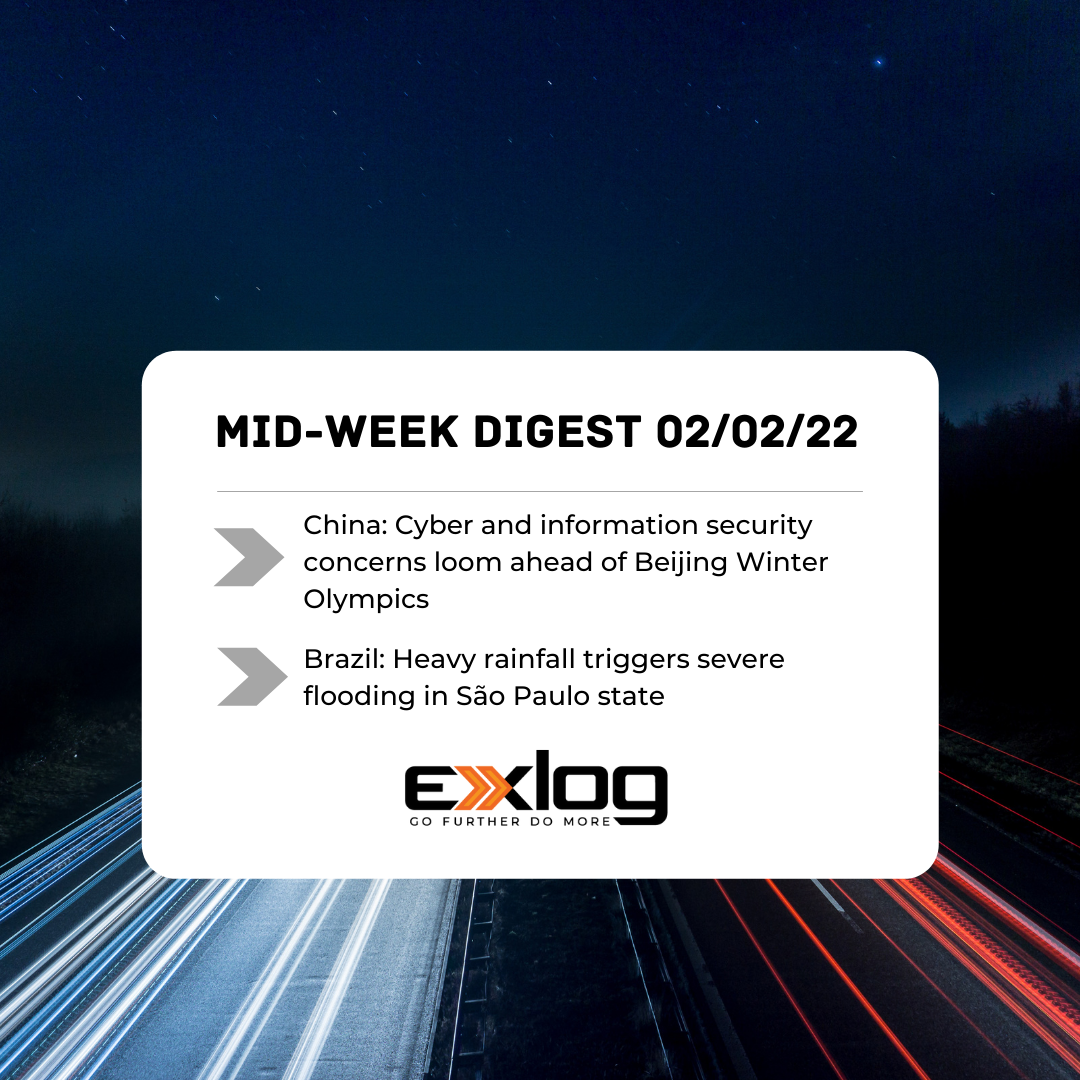Security threats facing Beijing Olympics and Flooding in Brazil’s São Paulo state
China: Cyber and information security concerns loom ahead of Beijing Winter Olympics
With the Beijing Winter Olympic Games due to commence on Feb. 4, a host of cyber and information security threats could complicate the security environment at the event. Historical precedent suggests that malicious cyber operations by a variety of threat actors are likely to increase ahead of and during the Olympics. While Russian, North Korean, or Iranian state-sponsored cyber-attacks targeting the games are unlikely due to relatively close relationship between China and those nations, the threat of cyber espionage activities targeting Olympics-associated entities and athletes emanating from those countries and the host nation should not be underestimated. According to the International Olympic Committee (IOC), China has agreed to provide athletes and foreign media with open internet service in the Olympic Village and other venues. However, users of unrestricted Chinese Wi-Fi service could become potential targets of surveillance. Several countries, including the US, UK, Canada, the Netherlands, and Australia, have advised their athletes to leave personal devices at home and recommended using disposable phones and a virtual private network (VPN) while in the country. Domestic censorship of journalists and athletes discussing politically sensitive topics is another concern given China’s human rights record – in particular the government’s treatment of Hong Kong, Tibet, and its ethnic Uyghur population. During the 2008 Beijing Summer Olympics, Chinese authorities vowed to lift all restrictions on media reporting; however, foreign journalists experienced threats and harassment, while some domestic reporters were jailed for covering sensitive issues including human rights abuses. Financially motivated cybercrimes targeting Olympic officials, corporate sponsors and partner organizations, and athletes are also likely. As observed during the 2020 Olympics in Tokyo, Olympic-themed phishing campaigns could range from fake streaming services to pages impersonating official IOC websites. Compared to threats relating to cyberspace and freedom of speech, there is a relatively lower physical security threat during the Olympics. Serious criminal activity is uncommon in Beijing due to the presence of law enforcement throughout the city, although petty crime is common on public transportation, in shopping areas, and near tourist sites. Serious crimes targeting foreign nationals are relatively rare. While physical safety threats are likely outweighed by concerns around Chinese state-sponsored cyber surveillance, risk mitigation measures accounting for both virtual and physical threats are recommended in order to avoid possible disruptions to personal or corporate security during the event.
Brazil: Heavy rainfall triggers severe flooding in São Paulo state
Flooding and landslides triggered by heavy rains in the state of São Paolo between Jan. 28-30 have claimed the lives of at least 27 people and impacted 31 municipalities. At least eight people remain missing and 1,546 families have been displaced. The circulation of trains was interrupted on the Line 7 between Caeiras and Francisco Morato due to flooding on the tracks. Traffic was disrupted on major roads and highways that provide access to the municipality of Franco da Rocha. The Represa Paiva Castro dam – located in the same municipality – was at nearly 80% capacity on Jan. 30; local authorities advised the population living in flood-risk areas to evacuate. While the full extent of the economic impact of recent rainfall remains unclear, damage to infrastructure and private property are significant. The governor of São Paulo has authorized USD 2.8 million in emergency aid for the 10 most affected municipalities: Arujá, Francisco Morato, Embu das Artes, Franco da Rocha, Paulo and Várzea Paulista, Campo Limpo Paulista, Jaú, Capivari, Monte Mor, and Rafard. A host of firefighters, military police, and civil defense personnel has deployed to assist in the rescue and recovery efforts. Brazil has witnessed multiple devastating storms since the start of its rainy season, which normally lasts from December to March. Heavy rainfall in Minas Gerais on Jan. 12 also led to catastrophic flooding and landslides, killing at least 15 people and displacing 28,000 others. In addition to casualties and damage to infrastructure and property, the rains have greatly inhibited the country’s COVID-19 vaccine campaign, with many scheduled vaccinations being canceled due to weather conditions. Extreme climate events, thought to be caused by the South Atlantic Convergence Zone and La Niña, are likely to persist in the coming months and could lead to harvest disruptions and interrupt mining operations throughout the country.


